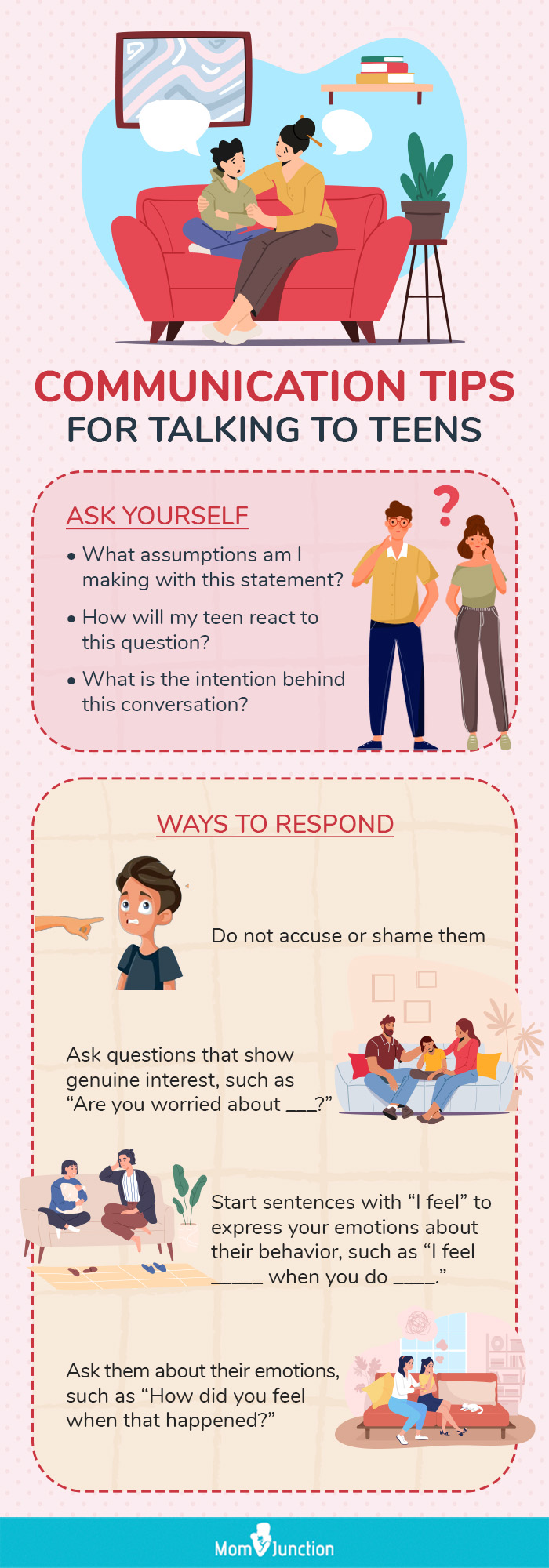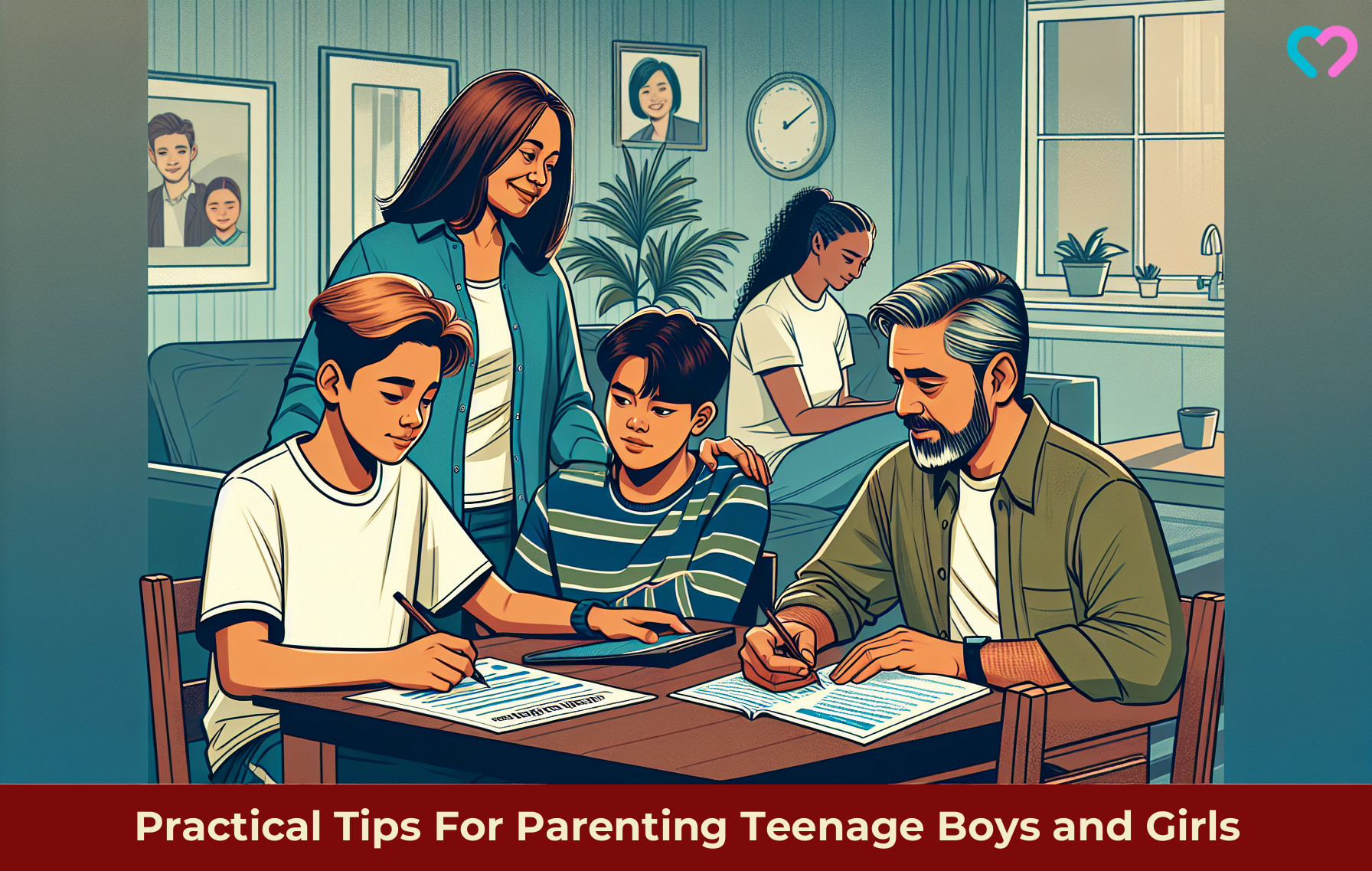
Image: iStock
The teenage years are a struggle for most children. Your child’s discipline may have been impeccable up until now, but teenage hormones can make them chaotic. Thus, read on as we tell you about parenting teenagers and helping your children become the best version of themselves.
During the teenage years, your child goes through a roller coaster of emotions, and it can make them moody. They might also feel like you don’t understand them. Keep scrolling to learn how to raise teenage boys and girls efficiently.
Understanding Adolescence
Puberty is one aspect of adolescence. Puberty is the process of physical changes, which involves the development of sexual organs, the beginning of periods in girls, and facial hair growth in boys (1). Adolescence also encompasses emotional and psychological changes. Parenting a teenager in this growing phase can be challenging.
A child becomes an adolescent and also hits puberty during the teen years. So yes, they are going through a lot of changes that can be overwhelming for them Your teen may not be at their best when trying to come to terms with the changes. How they behave around you, talk to you and deal with you and the rest of the world also changes.
 Point to consider
Point to considerThey may act like the stereotypical teen or worse. What they do is their reaction to the changes that come with age. How you behave with your ‘rebellious, stubborn or wild’ teen is your response to them. Your response is the only thing you can fully control.
Yes, your teen is going to get on your nerves and test your patience. And yes, they will drive you crazy, making you want to give up on parenting. So here is our advice for parents of teenagers: as the adult in the relationship, you need to make the right choices. You are the one who needs to think and act to get the desired reaction from your teen.
“But how??” you may ask. Well, keep reading to find out.
Tips On How To Raise Teenage Boys And Girls
Conflicts are bound to happen, but how you handle them will aid your child in regulating and managing their intense emotions. Also, it will help them learn positive ways of conflict resolution. Here, we have compiled a list of tips on how to parent a teenager (2).
1. Listen to your child:
Image: IStock
Often what seems like a decent chat with the teen can turn into a crazy argument at any moment. Such conversations are typical. In many ways, parenting a teen is similar to parenting a toddler going through huge developmental leaps. While a toddler may throw himself on the floor, a teen will use words, and sometimes not very nice. If you can remain calm, setting appropriate limits but not reacting with equal outrage, your relationship with your teen will develop in a healthy direction.
- Listen to what the teen has to say. They are growing individuals with an opinion of their own. They have a right to it. Respect their views, try to see their perspective and then agree or don’t agree with it. Listen more than you talk, to understand what’s going on in their mind (3).
- Teenage is a time when teens tend to spend more time with friends than parents. So try and spend more time together just talking, or doing something.
Have a chat with them often to know about their developing interests, hobbies, plans and other details of their life. Do not pry or force them to speak. Instead, gain their trust by believing them. When they trust you, they’ll tell you more.
A study reveals that children aged 10 to 15 relish spending moments with their parents, albeit dwindling as they age. The percentage of youngsters who appreciate being around their moms and dads declines as they grow older.
The graph below shows the percentage of boys and girls aged 14 to 15 years who enjoyed spending time with each parent. As indicated, the number is almost 50% among boys and girls for each parent. Overall, girls of 14-15 years of age tend to enjoy their time most with their mother while boys with their father.
Proportion of teens enjoying time spent with their parents by age and gender
Source: Relationships between parents and young teens; LSAC/Australian Institute of Family Studies- Your teens need privacy and ‘space’ as they grow more independent. So respect their privacy and give them their space (4). But do be informed about what they are doing or where they are going. Your kid may be growing up, but you still are the parent.
- Your teenager can be annoying. But they still need your love and affection. So Be the loving parent they need to get through these challenging years. Show your love through actions, not mere words.
- Have some fun together. Yes, you’ll have arguments and unpleasant experiences, but in between, have fun. Do things that you both enjoy.
Teens are independent and may not like it when you make decisions for them. So make it a point to involve them in decision-making. The decisions may not always be what they want, but at least they’ll be a part of the process. You can gain their confidence through this, and they are likely to share their plans with you.
Things to Avoid When Communicating:
- Yelling, whining, or nagging them to do things.
- Calling them names or patronizing them in front of their friends.
- Arguing about everything to get your way just because you are the parent.
A teen is a half-grown adult who needs a little guidance. They need limits set on their behavior. But making them a part of the conversation will work. So communicate.
2. Value your relationship:
Your teenager wants to be heard and understood, not judged. And to be able to do that, you need to listen to them, support them, have fun together and respect each other. In short, your teen should be comfortable sharing stories about their experiences. Of course, the degree to which they share may vary greatly according to their unique personality. But for all kids, an open and accepting listening stance will best support a healthy relationship.
There will be times when you have to pull ranks and become the authority figure to say no. Parental authority has a critical role to play and should not be seen as negative. A teen will likely not thank you for setting limits, but when they sense that you have appropriate authority, it helps them feel safe as they navigate this often turbulent stage of development.
3. Sex, lies and alcohol:
Some of the most delicate issues you need to deal with teenagers are sex, alcohol, and drugs. Many kids dread discussing these topics with their parents. They’d rather talk about it with their friends or a confidante at school. Hence, if you force the issue, they may feel pressured to lie to you. Here are some tips on dealing with these things with the teen. Some conflict is inevitable and an important part of growth and development.
Let’s talk about sex
Teenagers and parents are always inhibited when it comes to talking about sex. But, if you think that you need to have the “big talk,” then do so. Talking about sex can be easy with a 16-year-old, but it is important to talk about sex earlier and talk often. That said, teenagers do not like being ‘told’ what they should or should not be doing. So start a conversation and talk about it, discuss it and answer any questions the kid may have. That way, they also feel heard and will be open to listening to what you say (5).
When you listen, your teen is more likely to open up about their sexuality/sexual orientation, fears about sex, and maybe even heartbreak. In addition, you can make them understand better about underage sex and its dangers, such as teen pregnancies and Sexually Transmitted Diseases (STDs).
Tip: Make sure you are ready for the talk before initiating it. Let your teens understand that sex isn’t taboo and that they can be comfortable talking about it with you. Be careful not to make it an awkward chat. So if you have to research the internet to know ‘how to talk?’, do it.
It’s never just one drink
Underage drinking is a problem. According to the National Institute on Alcohol Abuse and Alcoholism, 3.4% of the total alcohol intake in the United States is linked to consumption by individuals aged 12 to 20. While teenagers drink less frequently than adults, they consume more alcohol per occasion. Binge drinking accounts for more than 90% of all alcohol consumed by young individuals.
So, talk to your teens before they get a taste of it. Speak to them about why it is important to wait until they are old enough. Tell them about the problems that drinking can create and how it can affect their performance, behavior, and moods. The idea here is to make children responsible
(6) (7).
- Set absolute limits about drinking and driving. They should feel safe to call you to pick them up if they have been drinking.
- Tell them about the good and the bad of alcohol – social drinking is okay when they age, but getting drunk is not cool. Some experimentation is typical and developmentally appropriate.
- Let this be a dialogue as well, so they can ask you questions and share their opinions.
- Try to learn what they already know about drinking and if they have had any experience with it.
- Set rules about drinking and have consequences if they break the rules.
Most of all, tell them that if they need help, like when they are in a situation where they’re scared of getting drunk (at parties or social events), they can always depend on you. Just one call, and you are there to take care of them.
Experimenting with drugs
For a teenager, almost everything is an adventure. They want to experience something once, just for the ‘thrill’ of it. But with drugs, it may not necessarily end there. Teenagers may get tempted to experience the high more and more, and before they know it, they are addicted to the substance. Here is what you can do to prevent the child from developing a problem with drug use (6) (8).
The first step is to prepare – if you do not know much about drug problems in teens, research about it. Find out how a child can get drawn to the habit and the different drugs they get their hands on.
- Watch out for signs of substance abuse, such as social withdrawal, using drugs alone, and a fall in academic performance. As with alcohol, some experimentation is typical. However, When you have a relationship of trust with your teen that grows out of years of listening to them, they will respect your authority and the limits you set on substance use. Also, provide them education on the legal aspects of drug use and the consequences of violating the law.
 Did you know?
Did you know?4. Choose your battles wisely:
With a teen, conversations may easily transform into arguments. So you need to be an adult and pick your battles wisely. Figure out the things for which you want to say ‘no’ and those which you should just let go. For instance, Some parents may forbid a tattoo or body piercing. Others may feel that this can be a relatively harmless expression of independence if it is small and located in a part of the body that is not generally visible.
But if it is something like a messy room, or coloring their hair, don’t worry too much. If you try to control every little thing your children do, they will be more likely to push back and resist asserting their independence.
5. Teen relationships – get to know their friends:
Relationships are among the many things your teen is exploring at that age. Adolescence is the age where they build meaningful friendships that can last a lifetime. During this time, your little girl or boy may also get attracted to members of the opposite sex and explore romantic relationships. In addition, they may be actively exploring their sexual orientation.
Now you may not like all their friends. You may worry that they are a bad influence on your child. Here is a tip: Don’t tell them to stop meeting a friend or seeing someone you think is not good enough for them. Do that, and they are sure to push you away. So, be open if you want the kids to talk to you about a relationship and maybe even ask you for relationship advice.
Take time to know your teen’s friends (9). Invite them for dinner, movie night or a party at home. Spend time talking to them, and you might even like them. If you still don’t like them, your teen will, at least, know that you have tried to understand them. Also, if you genuinely think that someone is a bad influence on your child, try talking to them about it and give a reason. They might understand.
Raising a teenager can be quite challenging, especially when you have concerns about your child’s friends. Kim Duncan, a mother to three teenage boys, provides valuable guidance on how to approach this situation. She suggests, “Welcome your child’s friends with open arms. Invest time in getting to know them, and spending time together, this will significantly enhance your connection with your child. Your child will sense your care and willingness to support them in their life (i).”
6. Always have rules:
Rules and limits have a critical role to play with teens, as they did with toddlers. Smart and successful parenting is based on well-defined, reasonable rules that come with consequences (10). Make sure that the kids know what the rules are and understand the consequences of breaking them. Most importantly, be consistent with the rules and the consequences. Both parents should work to be on the same page regarding rules, so discuss with your partner before laying down the rules. If there are two parents in the home, the sense that you are working together as partners will give your teen a feeling of safety as they take steps to explore and become independent.
It is important to understand that rules function as boundaries within which the teen can explore life to their heart’s content without harming themselves.
7. Teach them to be responsible:
Face it. Your baby has grown up and is a teenager who stands five or six feet tall. They are not helpless children anymore and may not need you for everything. That’s okay. Even if you do not like it, you need to accept that they are soon going to be adults and won’t need hand-holding. So rather than getting angry that they are making their decisions (you won’t be able to stop them anyway), teach them to be responsible.
Decision-making and critical thinking are two of the important aspects of responsibility. You need to teach your teenager to be responsible for themselves and the family and society. Some ways you can make them responsible are giving them chores, encouraging them to take up a summer job, or participating in volunteer work that aligns with their career planning (11). Make one thing clear – they are always accountable for their actions and behavior.
Be a good role model and take responsibility for things you do or mistakes you make.
8. Don’t let technology take over parenting:
How many teens you met do not have a social media account? How many of your teen’s friends or classmates do not have a smartphone?
No matter how hard you think, you won’t be able to come up with a number greater than five. Okay, ten at most! The reality is that we need technology to make our lives easier. Giving your teen a smartphone will make it easier for you to track their whereabouts. But it can also be annoying given how a teen is distracted by the phone, laptop, or tablet. While it is okay to let kids play with gadgets, it is not good to let them get addicted.
While it is okay to give them access to smartphones, laptops, and other devices, it is important not to let them get carried away by them. Have curfew rules that restrict usage of laptops, the internet, and social media. Help them find a way to balance time spent in the real world and on the World Wide Web. Remember, social skills are best taught in the real world.
9. Create a game plan:
Wherever they are – at a party, out with a group of teens, or spending the night at a friend’s place – have a plan for your teenagers to be in touch with you. Certain rules cannot be broken, like getting into a car with a drunk driver is a big NO. So even if it is 2 am, they need to call you. If they are stranded and have no way to get home, they call you.
Even though all these rules are logical and make sense, your teen will not like it if you force them on him or her. So, create a plan together, brainstorm, and let your teen come up with a few suggestions. That way, they make their decisions in life, of course, with your guidance and counsel.
An important tip here is to avoid manipulating them or swaying them in the direction you want. Teenagers are smart and will figure it out in no time, and when they do, they may not want to trust you again.
Some Tips For Parents of Teenage Girls
Not all teens are the same. Here are some additional tips on how to raise a teenage girl (12).
10. Make her resilient:
Yes, we may treat our little girls like princesses. Bring her up like a strong, resilient, and honest princess. Focus more on her character than her looks. More often than not, parents have this urge to protect their little girl from the bad world. While it certainly is your job to protect your kids, understand that you cannot always do so. And it is okay if they get a little hurt once in a while because that makes them stronger.
Your daughter will learn to deal with emotions like pain, sadness, jealousy and anger when she experiences them. Allow her to deal with breakups, fights with the bestie or something as silly as a bad hair day on her own. But let her know that you are there to hold her through difficult and painful moments.
Working through problems with her will help prepare her for life. If there is a problem, talk about it. Discuss possible solutions, but let her decide. Remember, her decision may not match yours. Support it anyway, as long as it doesn’t put her in harm’s way.
11. Instill confidence:
Image: IStock
Instill confidence in your little girl, and you will help her make her dreams come true. That said, make the distinction between confidence and overconfidence. While it is okay to believe that she can achieve anything she sets her mind to, she should also know about her limitations and capabilities.
Teach her to take little risks that bring in rewards she desires. It is okay if she fails. Most importantly, make her understand that she doesn’t need to be perfect.
12. Periods:
Usually, most girls get their first period when they are 12 or 13 (13). However, Some might get it before. Talk to your child about it early on. When your girl gets her first period, make sure you help her deal with it.
There’s not much you can do about the mood swings at that time. But talk about the importance of hygiene during the periods and keeping track of the menstrual cycle to be prepared for it every month.
 Quick tip
Quick tip13. Talk to her about boys – they will happen!
Boys. You cannot keep them away from your girl. Your little girl, who was happy to stay home and play ‘princess’ by herself, is now going out with boys! While you cannot stop a teen girl from dating, what you can do is talk to her about it – boys, dates, kissing, sex, and breakups (but not all at once!). Support her if she finds herself more interested in girls than boys.
Some More Tips For Raising Teenage Sons
14. Talk to them about girls:
Wouldn’t it be a proud moment for you as a mom, when you see girls loving and adoring your boy for who he is? But for that to happen, you need to bring up your boy to be a gentleman who treats women with respect. Teenage boys are attracted to girls and might want to explore their newfound sexuality sooner than later. Some will want to explore sexual attraction to boys rather than girls. Set an example by being open to questions and conversations about sex even before they enter puberty.
15. It’s okay to be emotional
Boys may be encouraged not to cry or show emotions (2). Teenagers are vulnerable to emotions. But they inhibit themselves from experiencing their feelings because society makes them feel that boys should be strong, not sensitive. Pent-up emotions can harm mental health and may lead to a breakdown. Also, suppressing emotions, for whatever reason, is not healthy.
Teach your teen boy that it is okay to be emotional. Encourage them to feel love, anger, happiness, sadness or whatever it is they are going through. Tell them it is okay to cry.
16. Give him space:
Image: IStock
We all heard the term “man cave”. While your boy is not yet a “man,” he still needs his space, and at times, he wants to be left alone. Give him his space. Unlike girls, boys don’t always want to share their thoughts, feelings, or experiences. Also, respect their privacy and always knock before entering their bedroom.
17. Managing facial hair:
Hormonal changes in the body will make facial hair appear sooner in some teens. These changes can be embarrassing, especially when they do not know how to handle them. Ask your spouse to talk to the kid about how to stay hygienic during the growing years. If you are a single mom, ask a significant male role model in the family to help your boy or do the research online and help him on your own.
Either way, the boy needs to know that he has your support.
And Then Some Don’ts
So far, we have discussed what you should do. Now, let us talk about things you should not do when parenting a teenage boy or girl.
1. Setting unreasonable expectations:
When you have kids, you should have house rules. But don’t make rules that are unrealistic. There is nothing wrong with having high standards and expectations, as long as they are realistic. Expecting them not to make mistakes is not right. So set realistic goals and expectations before coming up with rules. Think about how you were as a teenager. Think like a teenager and see if the rules seem fair or not.
2. Expecting the worst:
Image: IStock
If you have read a lot of literature on parenting teenagers, you might expect the worst when your kid enters the teens. Don’t! Teenagers aren’t as bad or difficult as most people think. If a teen is difficult, it is because the parents do not know how to handle their behavior. Yes, teenagers can be stubborn, rebellious and even annoying much of the time, and it’s nothing but typical.
But approaching teen parenting with a negative mindset will not help. Instead, show empathy, remain optimistic, and offer support; your teen will not have a reason to be difficult.
3. ‘Deal’ with them:
Your teenager is a person, not a situation that you have to ‘deal’ with or someone that has to be ‘handled’. Also, don’t always handle or deal with their situations for them. Treat your teenagers with respect and help them handle their problems, issues or concerns. Be their guide, go-to person or their rock that keeps them afloat. Do not try to control them, because if you do, they are more likely to rebel than agree with you.
4. Think you own them:
When you treat your teens like you own them (of course you do!), parenting them will only become so much more difficult. When you make a decision for them, they are not going to like it. Rather, include them in the discussions about their future and their life and let them be a part of the decision-making process. That makes them feel important and responsible too.
5. Treat them like helpless children:
Kids grow up. There will come a time when they do not need you at all. So, while your little girl or boy needed you for a lot of things, your teen is not helpless. Thus, stop trying to do things for them. In fact, they do not do anything that they can do for themselves. Also, teenagers are independent and do not want to be treated like little children. So treating a 14 or 15-year-old boy like you would a five-year-old is not a good idea.
Frequently Asked Questions
1. What are some parent-teenager problems?
Some common issues that might be a reason for parent-teen problems are academics, sibling rivalry, lack of trust, and freedom (14).
2. What to do when my teenager hurts my feelings?
When your teen hurts your feelings, it is essential not to take things personally and talk to your teen about what is bothering them. Moreover, listening to their concerns without judging, being there for them, and helping them with helpful advice could help them sail through the situation (15).
3. What should I know about teenage brain development and how it affects their behavior?
According to the American Academy of Child and Adolescent Psychiatry, a teenage brain differs greatly from an adult’s. They both function differently.The Amygdala, a part of the brain responsible for immediate reactions during fear or aggression, develops earlier, and the frontal cortex, which helps humans think reasonably before acting, develops later.
You must know this fact about brain development. You can suitably behave with your teenager without judgment while giving them the space to understand the consequences of their actions and grow accordingly (19).
4. What are some resources and support networks available for parents of teenage boys and girls?
Being the parent of a teenager is not an easy job, especially if you are a single parent. You should not be ashamed to ask for help and form a strong support system that consists of family, friends, and school counselors or authoritative figures in your teen’s life. You can also turn to youth groups and organizations that help provide structure and guidance for your teen, such as Boys and Girls Clubs, YMCA, YWCA, etc. (20).
Teenagers can be a handful, and parenting teenagers is different from parenting toddlers or infants. This phase of significant changes and hormonal fluctuations can bring about different behaviors in your child. The key to parenting teenagers is adapting to the changes without endangering their safety and compromising on good behavior. If your teenage son or daughter becomes distant and spends more time with their friends, understand that this is normal. In addition, try talking to them, giving them space, and understanding their issues to help them open up to you. Although the peer pressure that they may be facing and their rebellion and attitude can be concerning, remember to stay calm and deal with their problematic behavior wisely.
Infographic: How To Communicate Better With Your Teen?
Communicating with teens can be tricky since the scope for misunderstandings and tempers flaring is high. To understand how to have a healthy and productive conversation with your teen, go through the infographic below. Illustration: Momjunction Design Team
Key Pointers
- Being parents of teenagers can be challenging as they are going through emotional and physical changes.
- To establish a healthy equation, communication and understanding are important.
- Respecting their boundaries and space can help them feel positive and supported.
- Supporting their interests can foster their self-identity and promote positive self-esteem.
- Talking about sex, alcohol, and sexually transmitted diseases can prevent dishonesty and harmful consequences.
Image: Dall·E/MomJunction Design Team
Gain practical parenting tips, expert advice, and important insights that can help you navigate the turbulent terrain of being teen parents, from this video.
Personal Experience: Source
MomJunction articles include first-hand experiences to provide you with better insights through real-life narratives. Here are the sources of personal accounts referenced in this article.
i. How to be a better mom to a teenage boy.https://youtu.be/kYlNsP4MuZ4
References
- Puberty
https://medlineplus.gov/puberty.html - 10 Parenting Tips for Preteens and Tweens.
https://childmind.org/article/10-tips-for-parenting-your-pre-teen/ - Tips for Communicating With Your Teen.
https://childmind.org/article/tips-communicating-with-teen/ - Privacy, monitoring, and trust: pre-teens and teenagers.
https://raisingchildren.net.au/pre-teens/communicating-relationships/family-relationships/privacy-trust-teen-years - Talking with Your Teens about Sex: Going Beyond ”the Talk”.
https://www.cdc.gov/healthyyouth/protective/pdf/talking_teens.pdf - Talking to Teens About Drugs and Alcohol.
https://www.healthychildren.org/English/ages-stages/teen/substance-abuse/Pages/Talking-to-Teens-About-Drugs-and-Alcohol.aspx - Make a Difference: Talk to Your Child About Alcohol – Parents.
https://www.niaaa.nih.gov/publications/brochures-and-fact-sheets/make-a-difference-child-alcohol - Talk to Your Teen About Drugs—And Keep Talking.
https://www.healthychildren.org/English/ages-stages/teen/substance-abuse/Pages/Talk-to-Your-Teen-About-Drugs-And-Keep-Talking.aspx - Friendships — Helping Your Child Through Early Adolescence.
https://files.eric.ed.gov/fulltext/ED472023.pdf - Tips for Parents: Setting Rules With Teens.
https://www.childwelfare.gov/pubPDFs/ch_three_rules.pdf - Shifting responsibility to pre-teens and teenagers.
https://raisingchildren.net.au/pre-teens/communicating-relationships/family-relationships/shifting-responsibility-teen-years - Staying connected: A guide for parents on raising an adolescent daughter.
https://www.apa.org/topics/teens/raising-adolescent-daughter - Starting your periods.
https://www.nhs.uk/conditions/periods/starting-periods/ - Relationships with parents and families: pre-teens and teenagers
https://raisingchildren.net.au/pre-teens/communicating-relationships/family-relationships/relationships-with-parents-teens - Help for Parents of Troubled Teens
https://www.brainfacts.org/thinking-sensing-and-behaving/childhood-and-adolescence/2018/shaping-of-the-teenaged-brain-083018#:~:text=Adolescent%20behavioral%20changes%20have%20long,parents%2C%20%E2%80%9CIt’s%20hormones.%E2%80%9D - Shaping of the Teenaged Brain.
https://www.brainfacts.org/thinking-sensing-and-behaving/childhood-and-adolescence/2018/shaping-of-the-teenaged-brain-083018 - Teens: Alcohol And Other Drugs
https://www.aacap.org/AACAP/Families_and_Youth/Facts_for_Families/FFF-Guide/Teens-Alcohol-And-Other-Drugs-003.aspx - Menstruation in Girls and Adolescents: Using the Menstrual Cycle as a Vital Sign.
https://www.acog.org/clinical/clinical-guidance/committee-opinion/articles/2015/12/menstruation-in-girls-and-adolescents-using-the-menstrual-cycle-as-a-vital-sign - Teen Brain: Behavior Problem Solving and Decision Making.
https://www.aacap.org/AACAP/Families_and_Youth/Facts_for_Families/FFF-Guide/The-Teen-Brain-Behavior-Problem-Solving-and-Decision-Making-095.aspx - Help for Parents of Troubled Teens.
https://www.helpguide.org/articles/parenting-family/helping-troubled-teens.htm






















